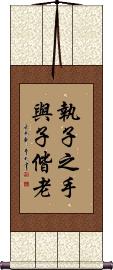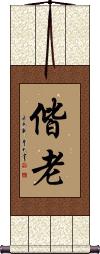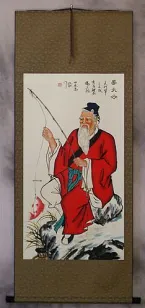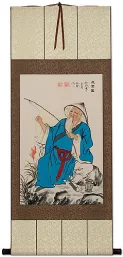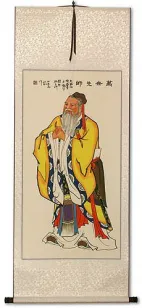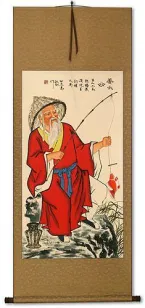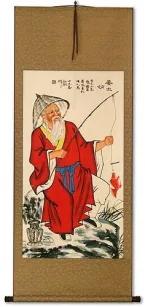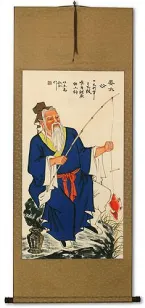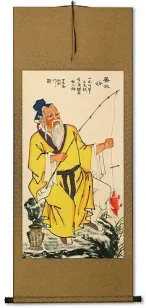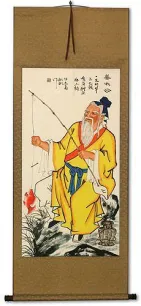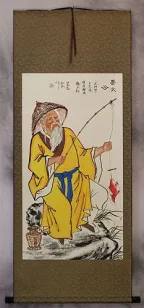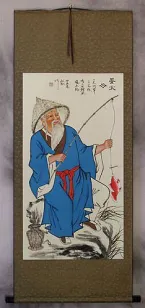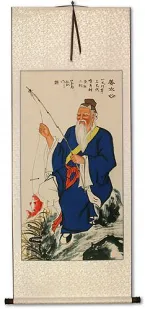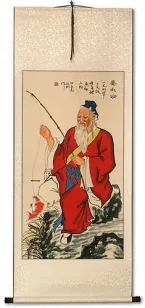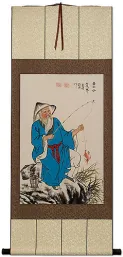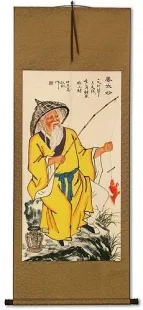Many custom options...
And formats...

Not what you want?
Try other similar-meaning words, fewer words, or just one word.
Grow Old in Chinese / Japanese...
Buy a Grow Old calligraphy wall scroll here!
Personalize your custom “Grow Old” project by clicking the button next to your favorite “Grow Old” title below...
Hold Hands with You, Grow Old with You
Growing Old Together
偕老 is a Chinese, Japanese, and Korean word that means to grow/growing old together.
This will be a nice wall scroll to hang in your home if your plan is to grow old with your mate.
Birth Old-Age Sickness Death
Born to Suffer
生老病死 means “to be born, to grow old, to get sick and to die” or “birth, aging, sickness, and death.”
This is an old somewhat-morbid Chinese proverb that is also used in Korean and Japanese. It figuratively means the fate of humankind (i.e. mortality) or suggests that we are all born to suffer.
In the Buddhist context, there are the “four inevitables in human life” or “four afflictions that are the lot of every human” known as “四苦” (literally “four afflictions”). Sometimes this proverb is written with that affliction character, 苦, at the end like 生老病死苦.
This in-stock artwork might be what you are looking for, and ships right away...
Gallery Price: $67.00
Your Price: $36.88
Not the results for grow old that you were looking for?
Below are some entries from our dictionary that may match your grow old search...
| Characters If shown, 2nd row is Simp. Chinese |
Pronunciation Romanization |
Simple Dictionary Definition |
偕老 see styles |
xié lǎo xie2 lao3 hsieh lao kairou / kairo かいろう |
More info & calligraphy: Growing Old Togethergrowing old together |
生老病死 see styles |
shēng lǎo bìng sǐ sheng1 lao3 bing4 si3 sheng lao ping ssu shouroubyoushi / shorobyoshi しょうろうびょうし |
More info & calligraphy: Birth Old-Age Sickness Death(yoji) {Buddh} the four inevitables in human life (birth, aging, sickness, and death) Birth, age, sickness, death, the 四苦 four afflictions that are the lot of every man. The five are the above four and 苦 misery, or suffering. |
寄る see styles |
yoru よる |
(v5r,vi) (1) to approach; to draw near; to come near; to be close to; (v5r,vi) (2) to gather (in one place); to come together; to meet; (v5r,vi) (3) to stop by (while on one's way to another place); to drop by; to make a short visit; (v5r,vi) (4) (See 年が寄る) to grow old; to grow high (number, etc.); (v5r,vi) (5) (in the form of しわが寄る) to grow (wrinkly); (v5r,vi) (6) (also written as 倚る, 凭る) to lean against; to recline on; (v5r,vi) (7) {sumo} to push one's opponent while holding their belt; (v5r,vi) (8) to decide on a price and come to a deal; (v5r,vi) (9) (archaism) to be swayed by (a person); to yield to |
老ゆ see styles |
oyu おゆ |
(v2y-k,vi) (archaism) (See 老いる) to age; to grow old |
變老 变老 see styles |
biàn lǎo bian4 lao3 pien lao |
to grow old; to age; aging |
年とる see styles |
toshitoru としとる |
(v5r,vi) to grow old; to age |
年取る see styles |
toshitoru としとる |
(v5r,vi) to grow old; to age |
年寄る see styles |
toshiyoru としよる |
(v5r,vi) to grow old |
歳とる see styles |
toshitoru としとる |
(v5r,vi) to grow old; to age |
歳取る see styles |
toshitoru としとる |
(v5r,vi) to grow old; to age |
老いる see styles |
oiru おいる |
(v1,vi) to age; to grow old |
老ける see styles |
fukeru ふける |
(v1,vi) to age; to grow old (esp. in appearance); to show marks of age |
長ける see styles |
takeru たける |
(v1,vi) (1) to excel at; to be proficient at; (2) to grow old; (3) to ripen; (4) to rise high (e.g. the sun) |
闌ける see styles |
takeru たける |
(v1,vi) (1) to excel at; to be proficient at; (2) to grow old; (3) to ripen; (4) to rise high (e.g. the sun) |
年が寄る see styles |
toshigayoru としがよる |
(exp,v5r) to grow old |
年をとる see styles |
toshiotoru としをとる |
(exp,v5r) to grow old; to age |
年を取る see styles |
toshiotoru としをとる |
(exp,v5r) to grow old; to age |
年を拾う see styles |
toshiohirou / toshiohiro としをひろう |
(exp,v5u) to grow old |
年老いる see styles |
toshioiru としおいる |
(Ichidan verb) to grow old |
年長ける see styles |
toshitakeru としたける |
(v1,vi) to grow old |
歳をとる see styles |
toshiotoru としをとる |
(exp,v5r) to grow old; to age |
歳を取る see styles |
toshiotoru としをとる |
(exp,v5r) to grow old; to age |
白首齊眉 白首齐眉 see styles |
bái shǒu qí méi bai2 shou3 qi2 mei2 pai shou ch`i mei pai shou chi mei |
(of a couple) to grow old together in mutual respect (idiom) |
老い込む see styles |
oikomu おいこむ |
(v5m,vi) to grow old; to weaken with age; to become senile |
長生不老 长生不老 see styles |
cháng shēng - bù lǎo chang2 sheng1 - bu4 lao3 ch`ang sheng - pu lao chang sheng - pu lao |
(idiom) to live forever and never grow old |
長生久視 长生久视 see styles |
cháng shēng - jiǔ shì chang2 sheng1 - jiu3 shi4 ch`ang sheng - chiu shih chang sheng - chiu shih |
(idiom) to live forever and never grow old |
年を重ねる see styles |
toshiokasaneru としをかさねる |
(exp,v1) to age; to grow old |
齢を重ねる see styles |
yowaiokasaneru よわいをかさねる |
(exp,v1) (See 年をとる) to grow old; to age |
Variations: |
kokemusu こけむす |
(v5s,vi) (1) to become covered in moss; to become mossy; to grow over with moss; (v5s,vi) (2) to become aged; to grow old |
Variations: |
takeru たける |
(v1,vi) (1) to excel at; to be proficient at; (v1,vi) (2) to grow old; (v1,vi) (3) to ripen; (v1,vi) (4) to rise high (e.g. the sun) |
Click here for more grow old results from our dictionary
The following table may be helpful for those studying Chinese or Japanese...
| Title | Characters | Romaji (Romanized Japanese) | Various forms of Romanized Chinese | |
| Hold Hands with You, Grow Old with You | 執子之手與子偕老 执子之手与子偕老 | zhí zǐ zhī shǒu yǔ zǐ xié lǎo zhi2 zi3 zhi1 shou3 yu3 zi3 xie2 lao3 zhi zi zhi shou yu zi xie lao zhizizhishouyuzixielao | chih tzu chih shou yü tzu hsieh lao | |
| Growing Old Together | 偕老 | kairou / kairo | xié lǎo / xie2 lao3 / xie lao / xielao | hsieh lao / hsiehlao |
| Birth Old-Age Sickness Death | 生老病死 | shou rou byou shi shouroubyoushi sho ro byo shi | shēng lǎo bìng sǐ sheng1 lao3 bing4 si3 sheng lao bing si shenglaobingsi | sheng lao ping ssu shenglaopingssu |
| In some entries above you will see that characters have different versions above and below a line. In these cases, the characters above the line are Traditional Chinese, while the ones below are Simplified Chinese. | ||||
Successful Chinese Character and Japanese Kanji calligraphy searches within the last few hours...
